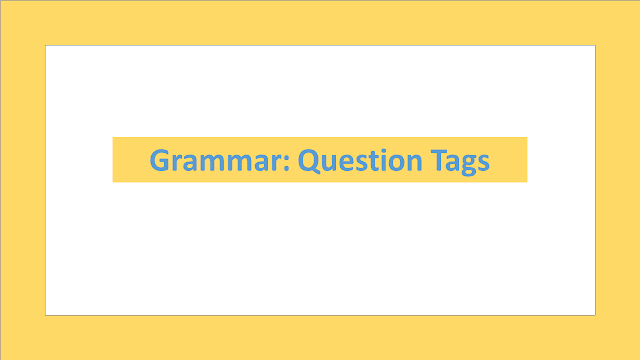Grammar:
Question Tags
A Question Tag is a tag in the
form of a question used for the conformation of the statement already made.
It has the following points:
It has the following points:
An affirmative statement has a
negative question tag.
Affirmative Statement Negative Question Tag
He is handsome, isn't he?
She came yesterday, didn't she?
They have their breakfast, don't they?
You will go tomorrow, won't you?
A negative statement has an affirmative question tag:
(Negative Statement) He does not (doesn't) go, does he?( Affirmative Question Tag)
Affirmative Statement Negative Question Tag
He is handsome, isn't he?
She came yesterday, didn't she?
They have their breakfast, don't they?
You will go tomorrow, won't you?
A negative statement has an affirmative question tag:
(Negative Statement) He does not (doesn't) go, does he?( Affirmative Question Tag)
(Negative Statement) She
cannot (can't) work, can she? (Affirmative Question Tag)
(Negative Statement) He does not (doesn't) have tea, does he? (Affirmative Question Tag)
(Negative Statement) They will not (won't) read, will they? (Affirmative Question Tag)
A question tag begins with an auxiliary verb. If there are not other auxiliaries, we use the verb do:
The boy is reading, isn't he?
The girl laughed, didn't she?
In the negative question tag, the short form of not, must be used:
Everybody was present at school, weren't they?
We shall meet you tomorrow, shan't we?
If the subject of a statement is a noun/pronoun, the subject of the tag must be a pronoun:
Mira/She is busy, isn't she?
Boys/They took their meal, didn't they?
‘have’ used as a main verb in the statement takes do (not have) in the tag:
They have their breakfast, don't they?
(Negative Statement) He does not (doesn't) have tea, does he? (Affirmative Question Tag)
(Negative Statement) They will not (won't) read, will they? (Affirmative Question Tag)
A question tag begins with an auxiliary verb. If there are not other auxiliaries, we use the verb do:
The boy is reading, isn't he?
The girl laughed, didn't she?
In the negative question tag, the short form of not, must be used:
Everybody was present at school, weren't they?
We shall meet you tomorrow, shan't we?
If the subject of a statement is a noun/pronoun, the subject of the tag must be a pronoun:
Mira/She is busy, isn't she?
Boys/They took their meal, didn't they?
‘have’ used as a main verb in the statement takes do (not have) in the tag:
They have their breakfast, don't they?
I had a dream last night,
didn't I?
‘used to’ in the statement takes ‘did’ in the tag:
There used to be an old tree, didn't there?
‘I am’ in the statement becomes aren't l? in the tag:
I’m happy, aren't I ?
‘used to’ in the statement takes ‘did’ in the tag:
There used to be an old tree, didn't there?
‘I am’ in the statement becomes aren't l? in the tag:
I’m happy, aren't I ?
I am writing a letter, aren't?
Imperative statement has its
tag will you?
Stop that noise, will you (or
won't you)?
See me tomorrow, will you (or won't you)?
let+ noun/pronoun (object) + verb changes into will you? or won’t you? in the tag:
Let me go now, will you or won't you?
Let him/her/it/them playing the yard, will you or won't you?
Let's+ verb (infinitive) gets shall we? in the tag:
Let’s go fora walk, shall we?
Let's work together, shall we?
But:
Let us go for a walk, will you?
Let us work now, will you?
Let us study the following examples:
He takes his breakfast, doesn't he?
There used to be a tree, didn’t there?
He never reads a book, does he?
You seldom sing a song, do you?
Nothing is right, is it?
All is wrong, isn’t it?
See me tomorrow, will you (or won't you)?
let+ noun/pronoun (object) + verb changes into will you? or won’t you? in the tag:
Let me go now, will you or won't you?
Let him/her/it/them playing the yard, will you or won't you?
Let's+ verb (infinitive) gets shall we? in the tag:
Let’s go fora walk, shall we?
Let's work together, shall we?
But:
Let us go for a walk, will you?
Let us work now, will you?
Let us study the following examples:
He takes his breakfast, doesn't he?
There used to be a tree, didn’t there?
He never reads a book, does he?
You seldom sing a song, do you?
Nothing is right, is it?
All is wrong, isn’t it?
All are well, aren’t they?
Nobody saw them, did they?
All/These/Those are mine, aren’t they?
One should obey the elders, shouldn’t one?
Everybody has slept, don’t they?
Nobody comes here, do they?
All/These/Those are mine, aren’t they?
One should obey the elders, shouldn’t one?
Everybody has slept, don’t they?
Nobody comes here, do they?
Someone stole my purse, didn’t
they?
dare and need (anomalous finites) have these tags:
She dare not speak, dare she?
He dared not go, dared he?
You need not speak, need you?
You did not need to go, did you?
dare and need (anomalous finites) have these tags:
She dare not speak, dare she?
He dared not go, dared he?
You need not speak, need you?
You did not need to go, did you?
But as ordinary verbs, these
have these forms in the tag:
He does/did not dare (to) cry, does /did he?
He does/did not need to go, does/did he?
He does/did not dare (to) cry, does /did he?
He does/did not need to go, does/did he?



.png)


0 Comments